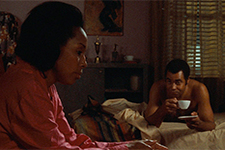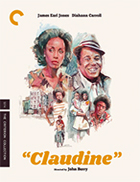Claudine
|  At the time of its release in 1974, Claudine was a rare film that centered on a black female protagonist. As film scholar Donald Bogle points out in his book Toms, Coons, Mulattoes, Mammies, & Bucks: An Interpretive History of Blacks in American Films, “very few films [at that time] attempted to explore a black woman’s tensions or aspirations or examine the dynamics of sexual politics within the black community.” The early ’70s had witnessed an explosion of films featuring black protagonists, many of which were also written and directed by black filmmakers, but these were predominately blaxploitation films, focused on swaggering male protagonists at the center of stories about crime and violence. The few films that did feature a female black protagonist were invariably also blaxploitation films that simple swapped the male protagonist for a female one played by Pam Grier or Tamara Dobson. Thus, Claudine, despite its seemingly modest story, budget, and scale, was something of a revolutionary film, one that took the basic template of the romantic comedy and used it to explore the lived experiences of a single black mother trying to make it financially, emotionally, and romantically in Harlem. The film deals directly with issues of female sexuality, motherhood, economic disparities and the so-called “welfare state,” and the struggles of being black in the immediate post-Civil Rights era—all topics that were largely left off the Hollywood screen. And, even though television had made some inroads in the 1960s and ’70s with series that featured black protagonists and centered on black lives, they were often either overly caricatured or scrubbed for the comfort of white audiences. One of those shows was Julia (1968–71), which centered around Diahann Carroll’s titular character, a nurse and widowed mother, making it the first American television series to portray a black female professional as its protagonist. The series, which ran for three seasons, was a source of unending controversy, primarily because critics felt that its depiction of single black motherhood was too neat and unrealistic, which is why the casting of Carroll as the titular character in Claudine, a film that is much more firmly grounded in the realities of a hard-knock life, was so important (she was not the first choice, though, as Diana Sands was originally cast and even began production, but had to drop out due to health problems that led to her death less than a year later). Carroll, who earned an Oscar nomination for her performance, plays Claudine as strong, but vulnerable; smart, but the victim of poor choices in her past; determined, but locked into a meager existence of domestic work and welfare. She is, in short, a portrait of what a lot of black Americans were dealing with and are still dealing with, fighting to survive in a system that feels stacked against them at every turn. Yet, Claudine is not an emotional downer; rather, it is quite the opposite, which is part of what makes it such an impressive and memorable film. The film’s director, John Berry, was an up-and-coming protégé of Orson Welles’s in the 1940s before he found himself on the wrong side of the Hollywood blacklist in the 1950s for his progressive politics. He had stayed busy during the blacklist years by directing films in Europe and had only recently returned to filmmaking in the U.S. in the mid-1960s with a handful of television episodes and the adventure film Maya (1968). Although his whitness means that he lacks direct experience in the situations depicted in Claudine, he nevertheless brings openness, emotional sensitivity, and a direct focus on the characters. His directorial style is clean and unadorned, which lets the relationships take center stage. We see this especially in Claudine’s relationship with her children, including her oldest son, Charles (Lawrence Hilton-Jacobs), an 18-year-old flirting with revolutionary politics, and her 16-year-old daughter, Charlene (Tamu Blackwell), who is trying to find her identity and is dangerously close to making the same life-changing choices that Claudine made when she was her age. The scene in which Claudine confronts Charlene after she comes home drunk and having been with a boy, is stark in its emotional bluntness, but also reassuring in the portrait it paints of the connections that can be forged between a concerned parent and a confused adolescent. Especially at a time when single black mothers were being demonized as “welfare queens,” it is a refreshing depiction of genuine parental care in the toughest of times. Screenwriters Tina Pine and Lester Pine, who were married and had collaborated on episodes for TV series like I Spy, Columbo, and All in the Family, make no bones about the tough realities that Claudine (and so many women like her) face on a daily basis, but at the same time it does not lock her into an unending and inescapable cycle of misery and desperation. Rather, the film presents the good with the bad, suggesting that there is joy to be found in the struggle and that sometimes people can and will do the right thing (the soundtrack, which is filled with songs by Gladys Knight & The Pips, often comments directly on the action playing a kind of Greek chorus reinforcing the film’s emotional shifts). We see this primarily in Claudine’s budding relationship with Roop (James Earl Jones), a sanitation worker she meets in the gilded white neighborhood in which she works as a housekeeper (the dismissive manner in which the wife who lives there complains on the phone about Claudine being late when she is just in earshot tells us all we need to know about her working situation). Roop is big and burly and open-faced, and when he asks Claudine on a date she initially resists because she has been burned by too many men in the past (she is, after all, a single mother with six kids at the age of 36). Yet, something about him breaks down her defenses and she agrees to the date, which her children, who range in age from 18 to 3, are reluctant to celebrate. They have obviously also been burned by the men in Claudine’s life, but Roop turns out to be different—to an extent. As embodied by Jones, Roop is full of life and vitality and charm, although we later learn that he is himself a deadbeat dad who doesn’t see his own children and later runs away from those responsibilities. He is, like Claudine, flawed and imperfect, which makes him fully human. He is no knight in shining armor or a Romeo beneath the balcony, but he is a hard-working man who maintains his values and sense of self despite his failings. And, most importantly, we get the feeling that he can be an even better man with Claudine, making their romance the best kind of all: redemptive for both of them, which is why we yearn for them to work it out.
Copyright © 2020 James Kendrick Thoughts? E-mail James Kendrick All images copyright © The Criterion Collection | |||||||||||||||||||||||||||||||
Overall Rating: 


 (3.5)
(3.5)


